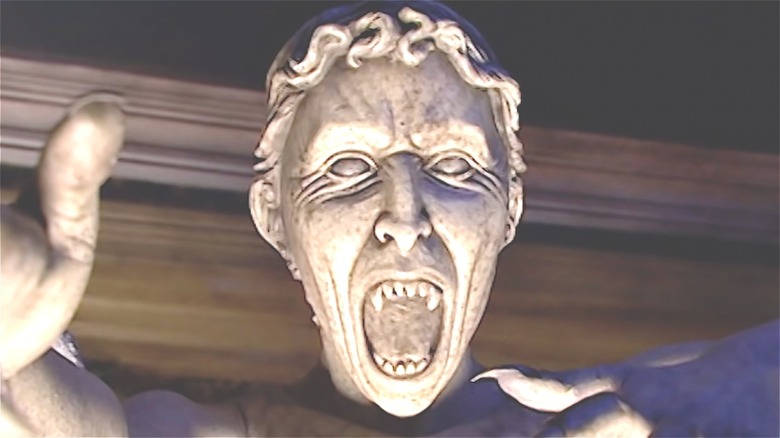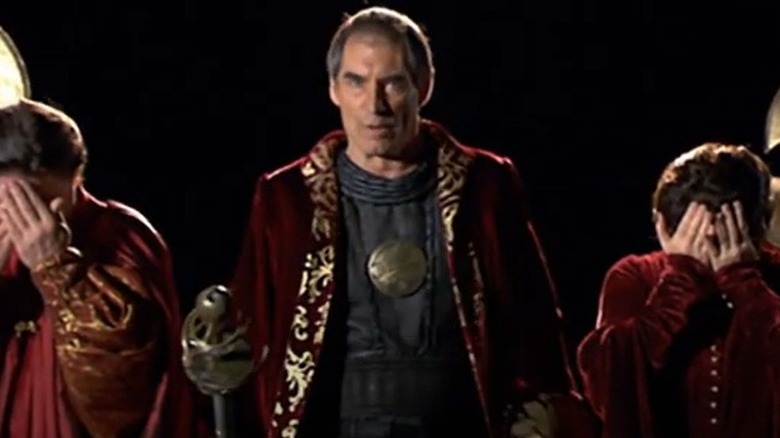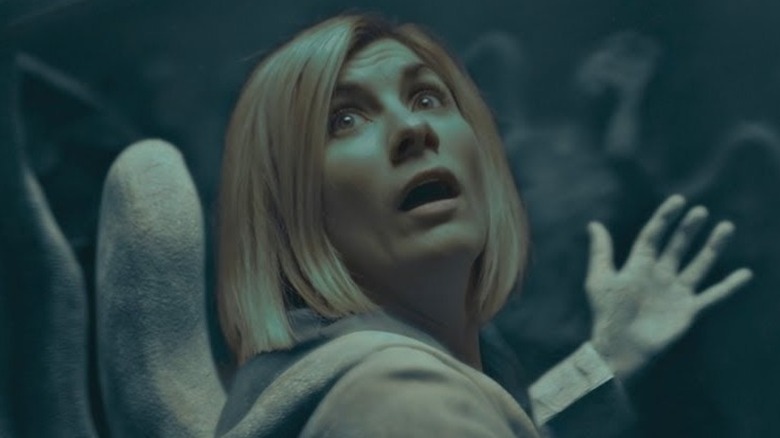The Weeping Angels Theory That Would Change Everything On Doctor Who
While the Daleks may remain the greatest villain in the history of "Doctor Who," among the most popular bad guys to be introduced since the show's revival in 2005 are the Weeping Angels. Introduced in the Steven Moffat-penned episode "Blink" during the David Tennant era in 2007, their debut is considered by many to be the best episode of modern "Doctor Who" – and the mysterious statues that can only move when you're not looking at them have naturally been the subject of much speculation by fans.
After Moffat took over as showrunner, he wrote a few more Weeping Angel episodes: the two-parter "The Time of Angels" and "Flesh and Stone," and Amy and Rory's farewell "The Angels Take Manhattan." The Angels also made a few cameos in other installments, such as Matt Smith's swan song, "The Time of the Doctor." And while these entities seemed primarily to be Moffat's baby, showrunner Chris Chibnall brought them back in the 13th series episode "Village of the Angels," the fourth part of the "Flux" arc.
Little is known about the origins of these strange creatures with the unique ability to throw people backward in time, but some fans seem to think they have an idea where the Angels came from.
The Angels may be fallen Time Lords
Many fans have brought up the theory that Weeping Angels may be fallen Time Lords (via CBR), based on a line of dialogue in David Tennant's final episode, "The End of Time: Part Two." In one sequence, Rassilon says that the Time Lords who stood against him would be forced to cover their faces and "stand as monuments to their shame like the Weeping Angels of old." This has led many to ask if Weeping Angels are Time Lords that have fallen out of favor or been punished for their transgressions.
While this theory may seem far-fetched at first glance, there's actually a surprising amount of evidence to back up the idea that Time Lords can become Weeping Angels, especially as a form of retribution. Fan u/Ninjabackwards brought a point to Reddit that there are clues as far back as the show's 20th anniversary special "The Five Doctors" in 1983. In that episode, Time Lord president Borusa shamelessly seeks a ring in the Tower of Rassilon that is said to grant the wearer immortality – only to find that he will live forever as a stone in Rassilon's tomb.
The Houston Press also brings up the 2002 Big Finish Audio story "Neverland," where it's revealed that the Time Lords sometimes punished their own people by erasing them from recorded time itself and banishing them to a realm known as the Antiverse. These "Neverpeople," as they're called, consume time ... not unlike the Weeping Angels.
Maybe the Angels work for the Time Lords
In "Village of the Angels," in which the 13th Doctor is actually turned into a Weeping Angel, we learn that these "Lonely Assassins" have been used as agents for a secret Time Lord agency known as the Division. The connection between the Angels and the Division has fueled even more speculation that the Weeping Angels may be fallen Time Lords. One Reddit user suggested that the Angels' work for the Division could be some form of parole for the former Time Lords — a way to atone for their misdeeds.
It's impossible to tell if this connection between the Time Lords and the Weeping Angels introduced by writers Chris Chibnall and Maxine Alderton was an attempt to capitalize on the existing fan theory or if it's just a coincidence. It wouldn't be the first time fan speculation was later established as canon; the now-infamous episode "The Timeless Children," for example, confirmed a long-held fan theory that there were more Doctors before the incarnation we know as The First Doctor. So it's possible that this fan theory could be corroborated in a future storyline ... But only time will tell.


